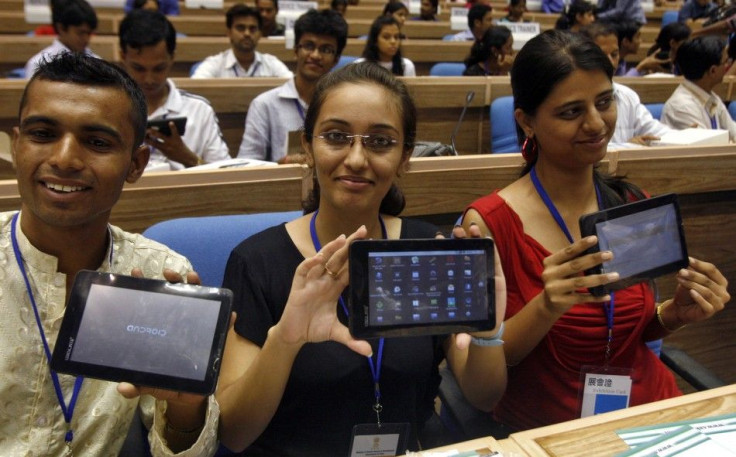India: For Facebook and Other Social Media, A Limitless Horizon
ANALYSIS

Facebook, which is planning to raise at least $5 billion in what will likely be a historic initial public offering, is one of the greatest financial success stories in the U.S. history.
Mark Zuckerberg’s company already has more than 845 million users worldwide and continues to grow.
One of Facebook’s key strategies is to expand in the emerging markets, particularly India.
India already has the second most Facebook users of any country, with close to 43,500,000. However, with the country’s population currently exceeding 1.17 billion, Facebook’s market share in India is a paltry 3.71 percent, the lowest percentage of any country in the top 15.
Thus, the upside potential for Facebook (and social media networks) in India is enormous.
International Business Times spoke with Vin Bhat, co-founder and CEO of Saavn (South Asian Audio Video Network), an Indian music service that is partnering with Facebook, about the expansion of social media networks and the internet as a whole in the sub-continent.
IB TIMES: Facebook has about 44 million users in India, but that represents less than 4 percent penetration. How can you seek to expand the number of Indian Facebook users?
BHAT: From our experience with Saavn on Facebook we are seeing that India loves sharing and listening to Bollywood music legally and for free. Music in India is a shared, social and culturally-ingrained experience, and previous to Saavn, there was no free and legal way to listen to Indian and South Asian music. People are finding everything from songs in the latest Bollywood film to music they haven't heard in ages and then sharing their songs and playlists with friends and family. This is exactly the type of social experience that will serve as a tipping point for social media registration and engagement in India.
We believe music and film will continue its dominance in Indian culture and will become deeply embedded in the emerging social media ecosystem.
IB TIMES: What are the main challenges Facebook faces in building its Indian market?
BHAT: We can't speak for Facebook specifically, but Internet and mobile penetration needs to continue to expand. Both are growing at rapid paces. In regards to mobile, operators are looking to secure more data-paying customers and social media and music are primary value-added services that they are leveraging to convert more Indians over to data-plans on Smartphones.
A lot of people are experiencing connectivity to the Internet through PCs or mobile devices for the first time, so there is a general need for hand-held users as they get comfortable with access to various types of connected services.
IB TIMES: Does the Indian government censor the Internet like China does? Would this put a crimp on your expansion program in India?
BHAT: Certainly not like China. India has cracked down on some forms of mass market messaging, or mobile spam and has also requested web and mobile data from certain providers in hopes of using the information to prevent future terrorist attacks. However, multinationals can operate in India and are not restricted at the same level as in China. India is a great market for any global technology brand.
IB TIMES: What percent of Indians have PCs? Or are they accessing the web through Smartphones, etc.?
BHAT: While we don't have the figures regarding the percentage of Indians that have PCs, we do know that there 100-million active Internet users. In addition, there are an estimated 60-million-plus smartphones in the market today and that number is growing at a very fast pace.
According to Convergence Catalyst, 2011 was significant in that smartphones breached the $100 price point with Android devices being launched in the market in the fourth quarter of 2011. Overall, smartphones are expected to jump from 12 percent to 14 percent of total mobile handset sales in 2012.
IB TIMES: The overwhelming majority of Facebook users in India are men. Why is this? And how can you attract more women to the site?
BHAT: We can't speak for any other partners but in Saavn's case we believe social media services will eventually start to even out in India. Historically men have become early adopters for many technology services, so that is no surprise here.
IB TIMES: Is growth in India crucial since China appears to be blocked off from Facebook?
BHAT: Growth in India is crucial to any major global technology service due to restrictions in China. There is no question about that.
IB TIMES: Some Indonesian clerics oppose Facebook because they feel it will corrupt the young. Are there similar attitudes in India?
BHAT: Generally, India is a very tolerant and multi-cultural and multi-faith society.
IB TIMES: Facebook had roughly 50 percent penetration in the U.S., Canada and some the western countries. Does Facebook feel it has saturated the developed markets?
BHAT: Again, we can’t speak to how Facebook feels about the U.S. and other western markets. Facebook, as well as any other social and mobile media services, has room to grow everywhere, both across age groups and countries.
Emerging markets like India present a historic opportunity for any consumer Internet brand to reach several hundred million people by the end of this year. That is an amazing feat for any company, and it seems Facebook is poised to get there soon.It's not crazy to think companies like Zynga, LinkedIn and Google+ could also get there.
© Copyright IBTimes 2025. All rights reserved.





















